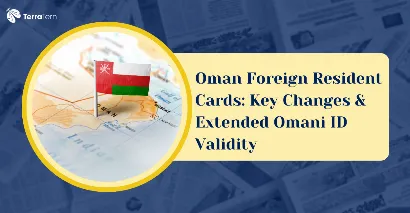Key Highlights
- Flexible Residency: What’s New?
- Resident Card Validity and Fee Structure
- Omani National ID Validity Extended to Decade
- Impact on Oman's Large Expatriate Community
- Administrative Requirements and Compliance
- Benefits for Different Expatriate Categories
- Document Requirements and Processing
- Regional Context and Modernisation Efforts
- Conclusion
Oman has recently introduced flexible foreign resident cards and increased the validity of Omani ID cards to a decade-long, making life easy for the largest expatriate community living in the country as well as the citizens. It is a significant change in policy, which was announced by the Royal Oman Police (ROP) in August 2025 and is expected to simplify the administration process and provide greater freedom in the management of residency requirements, something that will be greeted enthusiastically by both expats and Omanis.
Flexible Residency: What’s New?
The expatriate workforce of Oman, which was approximately 1.8 million by June 2025, can now have a range of resident cards that is based on the plans and budgets, so one can have one-, two-, or three-year resident cards. The change also does away with the pressure of heavy annual renewals, which allows more freedom to residents.
Also Read: Navigating the Waves of Culture Shock: A Guide to Thriving Abroad
Resident Card Validity and Fee Structure
The three-tier system gives the expatriates the option to make their decision in line with long and short stays, as well as based on financial choices in Oman. In the past, the limited choices were accompanied by more renewal demands from residents.
|
Validity Period |
Issuance/Renewal Fee |
Replacement Fee |
|
1 Year |
OMR 5 |
OMR 20 |
|
2 Years |
OMR 10 |
OMR 20 |
|
3 Years |
OMR 15 |
OMR 20 |
Omani National ID Validity Extended to Decade
In a similar move, the personal identity cards of the Omani citizens have been modified so that their validity is also ten years instead of five, matching that of the passports. This transforms the situation such that citizens do not have to renew crucial documents every five years.
The fee for the Omani ID cards for issuance, renewal, or replacement of the cards is still OMR 10. The extension will alleviate administrative workload on both the government agencies and the citizens, as well as keep the documents secure.
Also Read: 9 Best Jobs to Settle Abroad from India
Impact on Oman's Large Expatriate Community
Oman hosts approximately 1.8 million expatriate workers as of June 2025, distributed across various sectors:
Expatriate Distribution by Sector
These new regulations are expected to significantly benefit this diverse population by offering more convenient and cost-effective residency management options.
|
Sector |
Number of Workers |
|
Private Sector |
1.4 million |
|
Domestic Workers |
349,000 |
|
Government Employees |
41,000 |
|
Family Sector |
6,800 |
Administrative Requirements and Compliance
Any compromise of the residence or ID card record by holding a document requires its renewal within 30 days after expiration so that it would be in line with the Omani law. This requirement guarantees the existence of the legality of all residents.
According to the ROP, the amendments are aimed at supporting the easing of administrative work and giving the residents flexible alternatives to accommodate individual needs. The changes are a part of the current governmental initiative to modernise laws about civil status and increase the quality of public services up to international standards.
Also Read: Navigating the Waves of Culture Shock: A Guide to Thriving Abroad
Benefits for Different Expatriate Categories
The flexible system particularly benefits:
-
Short-term Residents: Can opt for one-year cards at a lower cost
-
Medium-term Residents: Two-year option provides a balance of cost and convenience
-
Long-term Residents: Three-year validity maximises convenience and value
Document Requirements and Processing
It is an obligation that each expatriate in Oman acquires a residence card within 30 days upon arrival. The application will involve:
-
Filled in the application form
-
Original passport
-
Ministry of Labour Medical examination certificates
-
A sponsor employment letter
Also Read: Average Salary in Oman: Know Factors, Jobs, Salary
Regional Context and Modernisation Efforts
This policy amendment is in line with the wider trends of administrative modernisation and expatriate-graving of policies characterising the Gulf Cooperation Council. These reforms enhance the economic diversification ambitions of Oman as they attract skilled professionals and investors to settle in the country by making residency much more appealing. The time factor lingers within the Vision 2040 of Oman, including the betterment of government services and the business environment for citizens and residents.
Conclusion
With the launch of Oman's flexible foreign resident cards, there is a key development in the way the Sultanate is dealing with expatriate services. Together with the move to increase Omani ID validity to 10 years, these changes prove that Oman is determined to achieve efficiency in administration and improve the well-being of residents. The new system offers a level of flexibility that 1.8 million expatriates have never had before, as it narrows down the bureaucracy in the operations of the government agencies and citizens. For official updates and application procedures on Oman’s new resident cards, visit the Royal Oman Police website. To know more about Oman's residency card, visit TerraTern now!








